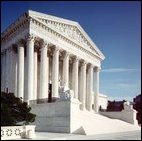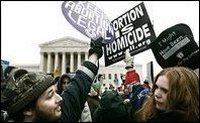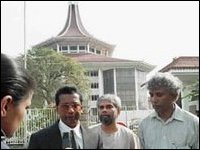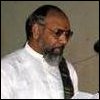
Supreme Difference
[TamilNet, Sunday, 03 July 2005, 15:24 GMT]
The Supreme Court, the most visible institution of the judicial branch, often plays a pivotal role in promoting trust in the government in a polarized society. Fundamental to the effective functioning of a supreme court is a secular constitution which protects minority rights, and a nation’s executive and legislative branches which practice good governance to enact laws benefiting the nation. Debates on new appointments to US Supreme Court and its recent controversial rulings render an opportunity to look at the functioning of the United States' “final arbiter of the law” to that of Sri Lanka’s.
 |
| U.S. Supreme Court
|
Constitution:
Written in 1787, ratified in 1788, and in operation since 1789, the United States Constitution vested judical power in Supreme Court, and together with the bill of rights of 1791 permitted a balance between society’s need for order and the individual right to freedom. Americans have a deep committment to the rule of law and to the constitution, the world’s longest surviving written charter of government, and have faith in Supreme court’s power of “judical review” and authority to invalidate legislation or executive action. U.S. Constitution’s first three words, “We The People” – affirm that the government of the United States exists to serve its citizens.
Religious freedom and separation of State and religion are enshrined in the Bill of Rights: “Congress shall make no law respecting an establishment of religion, or prohibiting the free exercise thereof; or abridging the freedom of speech, or of the press; or the right of the people peaceably to assemble, and to petition the Government for a redress of grievances.”
 |
| Photo: Washington Post
|
In contrast, the chequered history of Sri Lanka's constitution includes British Colebrooke-Cameron Commission reforms (1829), Donoughmore Constitution (1931), Soulbury Constitution (1946) and the Constitution of 1972 when Sri Lanka became a Republic. Executive Presidency was established in the 1978 constitution. The Constitution's secular nature and provisions to protect minority rights suffered in this process. Sri Lanka's ruling families, J R Jeyawardene (1978) and Chandrika Kumaratunge (2000, 2004), have often used or attempted to use the constitution to consolidate personal political power.
Article 29 (2) of independent Sri Lanka's Soulbury constitution barred the Ceylon Parliament from enacting discriminatory legislation against a particular ethnic or religious group to which all other groups were not subjected. Sinhala Buddhist pressure groups campaigned persistently for the removal of this article. It was eventually repealed in the 1972 Constitution of the Democratic Socialist Republic of Sri Lanka and was replaced by an Article entrenching the foremost place and state patronage for Buddhism.
 |
| Sri Lanka Supreme Court (TamilNet Library)
|
Although Sri Lanka's colonial heritage fostered a tradition of judicial freedoms, this has been compromised since independence by constitutional changes designed to limit the courts' control over the chief executive's power. Also, Parliament's willingness to approve legislation, such as the
1979 Prevention of Terrorism Act (PTA) vested broad powers on security forces to deal with subversives in an extra-legal manner. PTA facilitated widespread abuses of power, including the systematic torture of detainees, civil rights groups say.
Judicial Appointments: Power to nominate the Justices is vested in the U.S. President and appointments are made with the advice and consent of the Senate voted by a simple majority. However, even a
minority party in the Senate can derail judicial nominees using a procedure called filibuster. This safeguard results in appointments of justices with character and range of human experience and whose writings and positions on critical issues are close to the middle in conservative-liberal spectrum.

Americans follow the process of nomination, debates and final confirmation with great interest and candidates are scrutinized by media and other political organizations for their suitability to fill the position in the esteemed court.
In contrast, Sri Lanka’s President has uncontested power to appoint Chief Justices without oversight from any elected body. The 11 justices of the Supreme Court including the Chief justice are appointed by the President.
For example, Sri Lanka's present Chief Justice, Sarath Silva, was appointed amidst opposition from the press, the bar, and widely publicised allegations that he was guilty of abuse of power and corruption when presiding as Attorney General. Some human rights activists and lawyers allege that he deliberately dismisses Fundamental Rights cases by Tamils arrested, tortured and detained by Sri Lankan security forces.

Supreme Court Justice C.V Vigneswaran during his acceptance speech to his appointment to the Supreme Court in March 2001 said, "An original court judge cannot, under the present system of nominations to the higher judiciary, ever hope to occupy the highest office in the judiciary except due to the condescending discretion of the President of Sri Lanka.”
On minority appointments he said, "like the burghers we [Tamils] too would soon be hardly heard of in judicial, legal or government service or even in the private sector. It is a sad reflection of our times that after me there had not been a single Tamil speaking president of the Law Students' Union of the Sri Lanka Law College after 1962."
Jurisdiction and rulings: While the U.S. Supreme Court has original jurisdiction in a few cases its main work consists of appellate review of cases from state supreme courts or from lower federal courts. Its jurisdiction is limited to "cases" and "controversies" arising under federal law. Cases that arise from the state court systems may only be heard by the United States Supreme Court if they present an issue of federal law as happened in the Bush Vs Gore case. Debates, press coverage, majority and dissenting opinions of Justices in issues ranging from separation of state and religion, right to privacy, affirmative action and others contribute to modern jurisprudence and provide fascinating insight into the vibrancy, robustness of US legal system.
In Sri Lanka the Supreme Court exercises final appellate jurisdiction as well as special jurisdiction for alleged violations of fundamental rights and freedoms guaranteed under the Constitution.
The Supreme Court in Sri Lanka has increasingly come under attack by humanrights watchdogs for not providing the judicial safety net for the minorities and the vulnerable sections of Sri Lankan society.
Although Sri Lanka’s Supreme Court has ruled in favor of minority plaintiffs awarding cash compensations in several human rights cases, the Court has consistently failed to rule against security forces who have participated in several mass murders.
Recent rulings on the Bindunuwewa case expose the deplorable state of Sri Lanka's Supreme Court.
Alan Keenan, a Boston-based US Academic criticized the conduct of Supreme Court judges in the Bindunuwewa case as “grotesque example of the judges' utter disdain for the crimes under consideration and for the state's responsibility to determine the truth,” and observed that the “continuing legal and bureaucratic saga present powerful evidence of institutional discrimination against Tamils that persists even -perhaps especially- at the highest levels of the judiciary and the police.”
“At present Sri Lanka has neither the capacity to properly investigate such crimes, or to prevent them. Indeed, justice in Sri Lanka is in deep peril,” said the Asian Committee on Human Rights. Sri Lanka Democratic Forum said, “The entire Bindunuwewa episode illustrates the continued culture of impunity in Sri Lanka, and the devastating consequences for minorities when they confront the institutionalized discrimination of the Sri Lankan state.”
"The Court life seems to be more controlled now. Subjective thinking, personal prejudices and preference to interfere with the judicial decision making process seem to have pervaded the judiciary. This is not good for the future..." said Justice Vickneswaran in his retirement function three years after his appointment to the Supreme Court.
Related Articles:02.06.05
Rights Group condemns Bindunuwewa acquittals 30.05.05
Bindunuwewa massacre will not be the last - AHRC 19.07.04
PTA was big blunder by Tamil politicians - TNA MP 02.11.03
Sri Lanka’s Chief Justice to face impeachment motion 10.04.03
Sri Lanka justice system said conducive to torturers 10.01.03
Sri Lanka judiciary's failure led Tamils to take arms - Rani.. 20.12.02
PTA, ER, instruments to circumvent Human Rights norms – SC J.. 31.10.00
US Congressmen condemn prison massacre 25.10.00
25 killed in detention centre massacre 08.09.99
Protests against Sarath's Chief Justice appointment 29.10.98
Scandal surrounds Attorney General
External Links:










 Americans follow the process of nomination, debates and final confirmation with great interest and candidates are scrutinized by media and other political organizations for their suitability to fill the position in the esteemed court.
Americans follow the process of nomination, debates and final confirmation with great interest and candidates are scrutinized by media and other political organizations for their suitability to fill the position in the esteemed court.